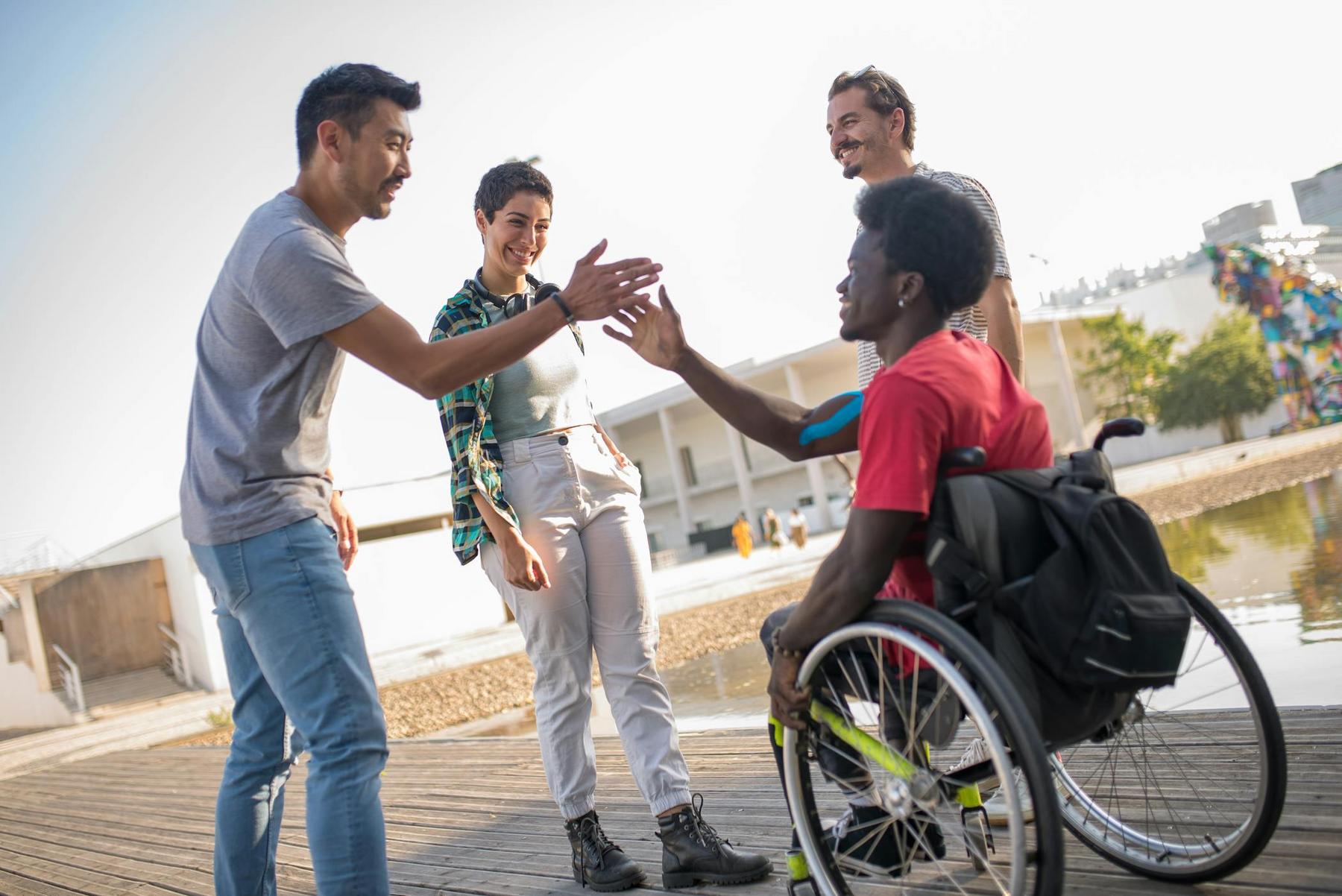Every parent knows that developmental milestone chart by heart. First smile. First word. First steps. But what happens when those milestones don’t arrive on schedule? When your child’s communication seems delayed, or their social interactions differ from their peers, or their motor skills develop more slowly than expected? The worry can be overwhelming—but you’re not alone, and there’s powerful support available right here in Brisbane and throughout Queensland.
Early intervention during the critical first seven years isn’t just helpful—it’s transformative. During these precious early years, your child’s brain makes over one million neural connections per second, creating the foundation for everything that follows. With the right support at the right time, children facing developmental challenges can reach their full potential, and families can move from anxiety to empowerment.
What Exactly Is Brisbane NDIS Early Intervention and Who Qualifies?
Brisbane NDIS early intervention operates under a specialised framework called the Early Childhood Approach (ECA), designed specifically for young children from birth to under nine years of age. This nationally recognised best-practice model currently supports over 80,000 children across Australia through the National Disability Insurance Scheme.
The eligibility criteria are refreshingly straightforward for young children. If your child is under six years old, they don’t need a formal diagnosis to access support—significant developmental delay alone is sufficient. This removes a major barrier that previously left families waiting months or years for diagnostic appointments before receiving help.
To qualify for Brisbane NDIS early intervention services, your child must:
- Be an Australian citizen, permanent resident, or Protected Special Category Visa holder
- Live in Australia (including Brisbane, Cairns, and surrounding Queensland regions)
- Meet one of three developmental delay criteria: delay due to mental or physical impairments, substantially reduced functional capacity, or requirement for specialist services
Children aged six to nine typically require a diagnosed disability or confirmed developmental delay, though assessment focuses on functional impact rather than diagnosis alone.
Approximately 20% of Australian children experience learning difficulties, developmental concerns, or developmental delay—meaning if you’re concerned about your child’s development, you’re far from alone. Recent data from the 2024 Australian Early Development Census reveals that only 52.9% of children nationally are developmentally on track across all five domains, representing a concerning decline from 55.4% in 2018.
What Services Are Available Through Brisbane NDIS Early Intervention Programmes?
Brisbane NDIS early intervention encompasses a comprehensive range of therapeutic and support services, all coordinated through a family-centred approach that puts you and your child at the heart of every decision.
Core Allied Health Therapy Services
The foundation of early intervention support includes specialised therapies tailored to your child’s unique needs:
Speech Pathology addresses communication skill development, language comprehension and expression, articulation difficulties, and social communication challenges. Research demonstrates that 70-80% of late-talking toddlers overcome language delays with early identification and intervention.
Occupational Therapy focuses on fine and gross motor skills, sensory integration, independence in daily activities like feeding and dressing, and adaptive techniques that help your child navigate their world more successfully.
Physiotherapy supports gross motor development, strength building, coordination enhancement, mobility improvements, and postural control—helping children master physical milestones at their own pace.
Psychology and Behavioural Support provides emotional regulation strategies, behavioural management approaches, and anxiety support, recognising that developmental challenges often impact a child’s emotional wellbeing.
The Key Worker Model: Your Single Point of Contact
One of the most valuable aspects of Brisbane NDIS early intervention is the key worker model—a best-practice approach recommended by the NDIS itself. Rather than juggling multiple professionals and appointments, you receive a single primary point of contact who coordinates all services on your behalf.
This key worker acts as the liaison between your family and the multi-disciplinary team, provides coaching and support in natural environments like your home, and reduces family stress by offering consistency. The transdisciplinary approach means professionals share strategies and techniques, ensuring everyone works toward the same goals with unified methods.
Service Delivery That Fits Your Life
Brisbane NDIS early intervention services are delivered where your child learns best:
- In-home support: The most common model, bringing therapy into your familiar environment
- Centre-based services: Specialised clinic settings when appropriate
- Community-based sessions: Support at parks, childcare centres, and preschools
- Telehealth options: Increasingly available for families in regional areas or with accessibility challenges
The emphasis remains on natural environment-based interventions—supporting development where children spend most of their time, during everyday routines like mealtimes, bath time, and play.
How Does the Brisbane NDIS Early Intervention Process Actually Work?
Understanding the pathway from concern to support can demystify what feels like an overwhelming system. The process in Brisbane follows clear, manageable steps designed to get your child the help they need efficiently.
Step 1: Initial Contact and Referral
You can begin by consulting your GP, paediatrician, child health nurse, or early childhood educator. Alternatively, self-refer directly to your local Early Childhood Partner. For Brisbane families, the Benevolent Society serves as the Early Childhood Partner, located at Ground Floor, 189 Coronation Drive, Milton, and contactable at 1300 003 234. Cairns families connect with Mission Australia at 1800 860 555.
Step 2: Gathering Supporting Evidence
You’ll submit medical reports, assessment reports from allied health professionals, observations from educators or family members, and evidence of how developmental delays impact daily functioning. Remember—no formal diagnosis is required for children under six.
Step 3: Assessment by Your Early Childhood Partner
An assessment team meets with you and your child, typically within two to four weeks of referral. This family-directed assessment evaluates your child’s development across domains and identifies your priorities and resources.
Step 4: Planning Together
Development of an individualised plan occurs collaboratively. You participate in goal-setting, budget determination, and service provider selection—maintaining choice and control throughout.
Step 5: Services Begin
Support commences as agreed in your plan, with regular review meetings (typically annually) and plan adjustments based on your child’s progress.
Brisbane NDIS Early Intervention Funding Categories
Understanding how funding works helps you maximise available support:
| Funding Category | Support Type | Example Services |
|---|---|---|
| Capacity Building – Daily Living | Therapy supporting daily functioning | Speech pathology, occupational therapy, skill development |
| Capacity Building – Relationships | Social-emotional development | Behavioural support, social skills groups, family training |
| Capacity Building – Health & Wellbeing | General health supports | Physiotherapy, dietetics, psychology |
| Core Supports | Ongoing daily assistance | Personal care, community participation, ongoing therapy |
| Capital Supports | Equipment and modifications | Assistive technology, home modifications, specialised equipment |
Average NDIS funding for children under seven sits at approximately $16,700 per year, though this varies significantly based on individual needs. For autistic participants under 18, average funding is approximately $24,000 annually.
What Makes Brisbane NDIS Early Intervention Effective? The Evidence Behind the Approach
The power of early intervention isn’t just anecdotal—it’s backed by decades of neuroscience research and rigorous outcome studies that demonstrate measurable, lasting benefits.
The Neuroscience Foundation
During the first five years of life, your child’s brain develops more rapidly than at any other time. The “first 2000 days”—from conception to age two—fundamentally influence developmental trajectory, affecting learning, health, and behaviour throughout life. Brain plasticity, or capacity to change, remains highest during these early years, making intervention during this window extraordinarily powerful.
Research-Supported Outcomes From Brisbane NDIS Early Intervention
Studies consistently demonstrate that early intervention:
- Improves language and communication skills substantially
- Enhances motor development and coordination
- Supports social-emotional development and peer relationships
- Improves academic readiness and school transition success
- Reduces need for intensive supports later in life
- Positively affects long-term crime reduction and employment outcomes
Importantly, research shows that quality of intervention and family involvement matter more than quantity. There’s no consistent relationship between more intervention hours and better outcomes—what matters is how well the intervention aligns with your child’s needs and how effectively you’re supported to implement strategies in daily life.
Evidence-Based Interventions Used in Brisbane
Speech-language therapy proves particularly effective for improving phonology and vocabulary, with longer-term interventions (over eight weeks) showing stronger results than time-limited treatments. Play-based speech therapy demonstrates exceptional effectiveness for young children.
Occupational therapy supports fine motor skills most effectively when interventions focus on play and peer interactions. Sensory integration approaches benefit daily living skills development, whilst environmental modifications enhance participation.
Physiotherapy improves gross motor skills, balance, coordination, and strength. Combined with structured exercise, physical therapy also reduces stereotyped behaviours and improves social interaction.
Combined multidisciplinary approaches demonstrate greater effectiveness than single therapy modalities, with coordinated strategies across therapies producing optimal outcomes.
The Family-Centred Approach That Defines Best Practice
Brisbane NDIS early intervention operates on four quality areas with eight key best practices:
Family Quality Area recognises families as the primary influence on child development, focusing on strengths rather than limitations. Joint goal-setting and capacity-building—strengthening family abilities—form the foundation.
Inclusion Quality Area promotes engagement in natural environments like home, community spaces, and early learning settings, fostering a sense of belonging and supporting peer interaction.
Teamwork Quality Area emphasises collaborative, transdisciplinary team approaches with coordinated service delivery, regular inter-professional communication, and shared decision-making.
Universal Principles Quality Area grounds all intervention in evidence-based practice, outcome-focused approaches, quality standards, and continuous improvement.
What Happens After Early Intervention? Supporting Transitions and Long-Term Success
As your child approaches age nine, Brisbane NDIS early intervention services support crucial transitions that set the stage for future success.
The Age Nine Transition
For children who’ve met their developmental goals, transition occurs to mainstream education or community supports, with connection to general health services and school-based support if needed. These children no longer require ongoing NDIS funding, representing a successful early intervention outcome.
For children requiring ongoing support, application to the main NDIS scheme occurs, with a shift from your Early Childhood Partner to a Local Area Coordinator. A new plan is developed reflecting age-appropriate needs and providing access to broader NDIS supports. In Brisbane, Carers Queensland serves as the Local Area Coordination partner (1300 999 636).
Long-Term Outcomes From Brisbane NDIS Early Intervention
Longitudinal research demonstrates impressive long-term impacts:
- Improved academic readiness and school performance
- Better social integration and peer relationships
- Enhanced independence in daily living
- Reduced need for special education services
- Lower crime and delinquency rates
- Better employment outcomes in late adolescence and adulthood
- Improved quality of life and life satisfaction
- Stronger family functioning and reduced parental stress
Early identification and intervention—particularly before age three—shows the greatest benefits. The investment in early intervention is highly cost-effective, reducing long-term costs of special education, health services, and justice system involvement whilst generating positive societal benefits through improved employment, reduced crime, and better health outcomes.
Your Role as the Most Important Member of the Team
Brisbane NDIS early intervention succeeds when families are genuinely empowered as partners. You’re not a passive recipient of services—you’re the expert on your child and the primary driver of their development.
How Families Drive Success
Direct involvement in therapy includes observing sessions, learning therapeutic strategies, implementing techniques during daily routines, and actively participating in goal-setting.
Home-based strategy implementation means applying learned approaches daily, practising during natural routines like mealtimes and bath time, embedding learning into everyday activities, and maintaining consistency across environments.
Advocacy and navigation involves understanding your child’s rights and entitlements, accessing NDIS information and support, connecting with community resources, and making informed decisions about services.
The family-centred approach recognises that parenting behaviour and parent-child interactions relate more strongly to intervention effectiveness than therapy intensity alone. Building your competence and confidence—capacity building—creates sustainable change that continues long after formal intervention ends.
Making the Most of Brisbane NDIS Early Intervention Services
Understanding current service availability and resources helps you navigate the Brisbane NDIS early intervention landscape effectively.
Current Context and Recent Changes
The NDIS has recently undergone significant reforms effective October 2024, including introduction of a new NDIS Supports List clarifying fundable supports, implementation of staged funding periods (quarterly or monthly release), and tighter eligibility and planning requirements. Importantly, early intervention was expanded from age seven to age nine in July 2023, recognising the continued benefits of support during these critical years.
Queensland specifically shows concerning developmental trends. The 2024 Australian Early Development Census found that 47.1% of Queensland children are not on track in at least one developmental domain, with particular vulnerability in emotional maturity for regional children (11.5%, up from 9.8% in 2021).
Accessing Brisbane-Specific Support
Benevolent Society serves as Brisbane’s Early Childhood Partner, covering Brisbane, Caboolture, Loganholme, and Hillcrest areas. Their appointment-only office at Ground Floor, 189 Coronation Drive, Milton, provides an accessible central Brisbane location, or families can contact them at 1300 003 234 or [email protected].
Mission Australia serves Cairns families at 379 Little Spence Street, Bungalow, contactable at 1800 860 555 or [email protected], covering Cairns, Manunda, Mareeba, Innisfail, and Yarrabah.
Recognising When Your Child May Benefit
Common signs of developmental delay that warrant assessment include:
Communication concerns: Not babbling by six months, not using single words by 12 months, not using simple phrases by 18 months, difficulty articulating words, limited vocabulary for age, or difficulty understanding directions.
Motor development concerns: Delayed crawling, walking, or running, difficulty grasping objects, poor coordination or balance, weakness or stiffness in limbs, or unusual movement patterns.
Social-emotional concerns: Limited eye contact, difficulty playing with other children, repetitive or unusual behaviours, extreme irritability or withdrawal, or difficulty with social cues.
Self-care concerns: Difficulty feeding independently, challenges with toilet training at expected age, inability to follow simple daily routines, or difficulty with self-regulation.
If you notice any of these signs, early contact with your GP or direct referral to your local Early Childhood Partner can initiate assessment. Early identification consistently produces better outcomes than delayed intervention.
Moving Forward With Confidence
Brisbane NDIS early intervention services offer more than therapy appointments and funding—they provide hope, partnership, and proven pathways to your child’s potential. The first seven years represent a unique window of opportunity when intervention makes the greatest difference, and accessing support earlier rather than later consistently produces stronger outcomes.
The system may feel complex initially, but thousands of Queensland families have successfully navigated this pathway. With autism alone accounting for 37% of all NDIS participants, and 99% of autistic people aged 18 and under who applied in 2024 being accepted, the NDIS recognises the critical importance of supporting children’s development during these formative years.
Your concerns about your child’s development are valid. Your desire to provide the best possible support is commendable. And the resources available through Brisbane NDIS early intervention—from the multidisciplinary teams and evidence-based therapies to the family-centred approach and coordinated support—are designed specifically to partner with you in this journey.
The brain plasticity that makes early childhood development so rapid also makes early intervention so powerful. Every day represents new neural connections, new learning opportunities, and new possibilities. With the right support at the right time, your child can develop the skills, confidence, and capabilities that form the foundation for lifelong success.
Whether you’re just beginning to wonder about your child’s development, you’re navigating the assessment process, or you’re already receiving services and seeking to understand your options better, Brisbane NDIS early intervention stands ready to support you with expertise, evidence, and empathy.
Does my child need a formal diagnosis to access Brisbane NDIS early intervention services?
No diagnosis is required for children under six years of age. If your child shows significant developmental delay, they can access Brisbane NDIS early intervention based on a functional assessment alone. For children aged six to nine, a diagnosed disability or confirmed developmental delay is typically required, with assessment focusing primarily on the child’s functional impact.
How long does it take from initial referral to actually receiving Brisbane NDIS early intervention services?
Most families meet with the Early Childhood Partner assessment team within two to four weeks of submitting their referral. After assessment and planning meetings, services typically commence within several weeks, though the timeline can vary based on individual circumstances and service availability.
What happens to my child’s Brisbane NDIS early intervention support when they turn nine years old?
At age nine, children transition from the Early Childhood Approach. Those meeting their developmental goals may no longer require ongoing NDIS funding, transitioning to mainstream education or community supports. For those needing continued support, a new plan is developed under the main NDIS scheme with assistance from a Local Area Coordinator.
Can I choose my own therapists and service providers under Brisbane NDIS early intervention funding?
Yes, the NDIS emphasises participant choice and control. You can select your preferred service providers, whether they are large organisations or individual practitioners, as long as they are registered NDIS providers. Your Early Childhood Partner will provide information about available providers, but the final decision remains yours.
How much support do parents need to provide during Brisbane NDIS early intervention—can’t therapists just work with my child directly?
Parental involvement is a key factor in the success of early intervention. Therapists provide guidance and coach parents to implement strategies throughout daily routines. Research shows that active parental participation leads to significantly better outcomes than models where therapists work with the child alone.



